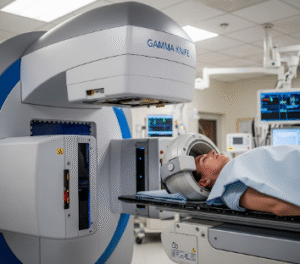Overview
Urethral Cancer is a rare type of cancer that occurs in the urethra—the tube that carries urine from the bladder out of the body. It can develop in both men and women and is often diagnosed at a later stage due to subtle or overlooked symptoms. Early detection improves outcomes, but treatment may involve surgery, radiation, and chemotherapy depending on the location, size, and stage of the tumor.
What is Urethral Cancer
Urethral Cancer is a malignant tumor that originates in the tissues of the urethra. The cancer can arise from different types of cells, including squamous cells, transitional cells, or glandular (adenocarcinoma) cells, depending on the portion of the urethra involved. It is more common in older adults and affects males slightly more frequently than females. Urethral cancer may spread to surrounding tissues, lymph nodes, or distant organs if not treated early.
Symptoms
Symptoms may develop gradually and are often similar to other urinary tract conditions:
- Blood in the urine (hematuria)
- Blood at the urethral opening
- Frequent urination or urgency
- Weak or interrupted urine stream
- Pain or burning during urination
- Lump or growth in the perineum or along the urethra
- Urethral discharge
- Incontinence or urinary retention (in severe cases)
- Swelling or tenderness in the groin (due to lymph node involvement)
Causes
The exact cause of urethral cancer is unknown, but it is linked to factors that irritate or inflame the urethral lining:
- Chronic urinary tract infections (UTIs)
- Sexually transmitted infections (e.g., HPV)
- Urethral strictures or scarring
- History of bladder cancer or other urinary tract cancers
- Previous radiation therapy to the pelvis
- Prolonged catheter use or urethral instrumentation
Risk Factors
- Age over 60
- Chronic inflammation of the urethra
- Human papillomavirus (HPV) infection
- History of bladder or genital cancers
- Smoking
- Urethral stricture disease
- Radiation therapy to the pelvic region
- Exposure to carcinogenic substances in urine
Complications
- Urinary obstruction or retention
- Spread of cancer to bladder, prostate, or vagina
- Lymph node metastasis, especially in advanced cases
- Urinary incontinence after surgical treatment
- Sexual dysfunction
- Psychological stress or body image concerns
- Recurrence or secondary tumors
Prevention
While urethral cancer is not entirely preventable, the following measures may reduce risk:
- Prompt treatment of UTIs and urethral strictures
- HPV vaccination, especially in younger individuals
- Safe sexual practices to reduce risk of sexually transmitted infections
- Quit smoking, which reduces risk of many urological cancers
- Regular urologic check-ups for those with prior bladder or urethral conditions
- Minimize unnecessary long-term catheterization
Treatment Options in Korea
South Korea offers advanced diagnostic tools and comprehensive treatment options for urethral cancer, combining surgical expertise, oncology care, and rehabilitation:
- Cystoscopy and biopsy: Essential for confirming the diagnosis and tumor type
- MRI or CT scan: For staging and determining spread
- Surgery:
- Local excision for small or superficial tumors
- Urethrectomy or partial urethrectomy for localized invasive cancer
- Cystoprostatectomy or anterior exenteration in advanced cases
- Radiation therapy: External beam radiation or brachytherapy used for inoperable tumors or as adjunct therapy
- Chemotherapy: Systemic treatment for metastatic or high-grade tumors
- Immunotherapy: In select cases, especially for recurrent or resistant tumors
- Reconstructive surgery and pelvic floor rehabilitation may be offered after extensive procedures
- Multidisciplinary cancer care teams ensure coordinated and personalized treatment plans
With access to modern medical technology and skilled specialists, South Korea provides high-quality care for patients with rare and complex cancers like urethral cancer.













